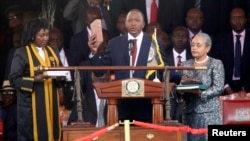Kenya’s parliament plans to start work Thursday reviewing President Uhuru Kenyatta’s cabinet nominees.
But some members of parliament’s Appointments Committee have vowed to oppose the process after accusing President Kenyatta of contravening the constitution.
Lawmaker John Madi, a leading member of the Appointments Committee, says the list of cabinet nominees does not reflect regional and ethnic balance as stipulated in the constitution.
He says the list of candidates Kenyatta presented to parliament falls short of Article 152 of the constitution, which spells out the requirements of cabinet composition.
“Our constitution is very clear. It not only talks about regional balance, but also talks about ethnic balance,” Madi said. “This was because Kenya has been ethnically divided for a long time, and that is what brought the issues [post-election violence] that we had in 2007-2008.”
Kenya has 42 ethnic communities, with the Kikuyu, Luhya, Kalenjin and Luo being the four largest groups respectively. President Kenyatta is a Kikuyu while, deputy president William Ruto is a Kalenjin.
“If you look at the recent appointments, two ethnic communities -- whatever their sizes, or which is producing the president and the deputy president -- have contributed seven members to the 16-member cabinet, thereby leaving only nine slots for the other 40 ethnic communities,” said Madi. “The community of the deputy president is contributing four members of the cabinet secretaries, and the president’s community is producing three, with a fourth one coming from a closely related ethnic community.”
Madi says the cabinet list shows the two leaders were not ethnically sensitive in their selection.
“If you look at the Mount Kenya region and the Kalenjin community is producing eight out of 16 -- that is 50 percent of the cabinet secretaries. That is unfair to the rest the 40 other communities…in my view and in the views of my other colleagues, it is ethnically imbalanced the list of nominations,” he said.
Some supporters of the ruling Jubilee coalition party rejects the accusation, saying that both the president and his deputy chose the best qualified people to serve the country irrespective of their ethnicities.
They argue that the criticisms are aimed at creating divisions within the ruling coalition, which they said comprises all ethnic groups in the country.
But, Madi says the lack of balance creates tension and suspicion among other ethnic groups, which he said could potentially destabilize the country.
Madi says many Kenyans agree with him that the cabinet nominees consist mainly of the Kikuyu and Kalenjin ethnic groups, which he said is detrimental to the country’s unity.
“The confidence I have is that a good number of legislators, even from the Jubilee side who are coming from the outside of the two ethnic blocs, are actually unhappy. They are unhappy because despite the fact that they belong to Jubilee, that they are not included in the nominations to the cabinet. Therefore, because of that we may hold the government to account,” said Madi.
But some members of parliament’s Appointments Committee have vowed to oppose the process after accusing President Kenyatta of contravening the constitution.
Lawmaker John Madi, a leading member of the Appointments Committee, says the list of cabinet nominees does not reflect regional and ethnic balance as stipulated in the constitution.
He says the list of candidates Kenyatta presented to parliament falls short of Article 152 of the constitution, which spells out the requirements of cabinet composition.
“Our constitution is very clear. It not only talks about regional balance, but also talks about ethnic balance,” Madi said. “This was because Kenya has been ethnically divided for a long time, and that is what brought the issues [post-election violence] that we had in 2007-2008.”
Kenya has 42 ethnic communities, with the Kikuyu, Luhya, Kalenjin and Luo being the four largest groups respectively. President Kenyatta is a Kikuyu while, deputy president William Ruto is a Kalenjin.
“If you look at the recent appointments, two ethnic communities -- whatever their sizes, or which is producing the president and the deputy president -- have contributed seven members to the 16-member cabinet, thereby leaving only nine slots for the other 40 ethnic communities,” said Madi. “The community of the deputy president is contributing four members of the cabinet secretaries, and the president’s community is producing three, with a fourth one coming from a closely related ethnic community.”
Madi says the cabinet list shows the two leaders were not ethnically sensitive in their selection.
“If you look at the Mount Kenya region and the Kalenjin community is producing eight out of 16 -- that is 50 percent of the cabinet secretaries. That is unfair to the rest the 40 other communities…in my view and in the views of my other colleagues, it is ethnically imbalanced the list of nominations,” he said.
Some supporters of the ruling Jubilee coalition party rejects the accusation, saying that both the president and his deputy chose the best qualified people to serve the country irrespective of their ethnicities.
They argue that the criticisms are aimed at creating divisions within the ruling coalition, which they said comprises all ethnic groups in the country.
But, Madi says the lack of balance creates tension and suspicion among other ethnic groups, which he said could potentially destabilize the country.
Madi says many Kenyans agree with him that the cabinet nominees consist mainly of the Kikuyu and Kalenjin ethnic groups, which he said is detrimental to the country’s unity.
“The confidence I have is that a good number of legislators, even from the Jubilee side who are coming from the outside of the two ethnic blocs, are actually unhappy. They are unhappy because despite the fact that they belong to Jubilee, that they are not included in the nominations to the cabinet. Therefore, because of that we may hold the government to account,” said Madi.











